Eradicate religious fanatics
Updated: 2013-12-18 08:17
(China Daily)
|
||||||||
The three evil forces of separatism, extremism and terrorism are the enemy of the people of all ethnic groups in the Xinjiang Uygur autonomous region. The elements that are part of or support the evil forces don't want to see the development and prosperity of socialist China. In fact, they are afraid to see all ethnic groups in Xinjiang live a happy life lest it defeats their evil designs. The fight against the three evil forces is an intense political struggle for China to safeguard national unity and maintain social stability, says an article in the Xinjiang Daily. Excerpts:
Politicization of religious issues has been undermining the political integration process of the multi-ethnic region of Xinjiang. It has also become a burning issue for many states in the process of political development. Eradicating terrorist and separatist activities that are led by religious extremists is the only choice that a multi-ethnic state has to achieve political integration.
Most developing countries undergoing modernization are faced with difficulties of varying degrees in their political integration process. Usually, a multi-ethnic state also has a variety of ethnic-religious organizations. Most of these ethnic-religious organizations have political attributes and exercise a certain amount of political influence on the state power system. Of course, religious factors here do not refer to a particular religion, but factors relating to religion and the politicization of religious issues. If the implication and impact of religious activities extend beyond the scope of religion, it will have social and political consequences and could even lead to social unrest and political instability.
Religious-political factors, especially the issue of religious politicization in Xinjiang, have had a negative impact on China's political integration. Factors relating to religion and the religious politicization in Xinjiang have become a major factor affecting China's political integration, and pose a real threat to China's political unity.
Xinjiang is a region with the most complex religious issues. And pan-Turkism and pan-Islamism pose the biggest threat to China's governance in Xinjiang. The essence of this ideological trait, albeit with different methods in different periods, is to split the country and undermine its national unity.
Religious extremism deceives even the truly religious soul, and forms the basis of terrorism and separatism. Religious extremists, and ethno-separatist and terrorist forces have joined hands to unleash destruction and violence around the world.
 Russia to bail out Ukraine for $15 billion
Russia to bail out Ukraine for $15 billion
 Fatal tiger attack 'points to flaws in zoo management'
Fatal tiger attack 'points to flaws in zoo management'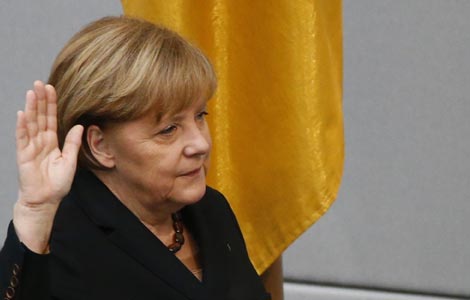
 Merkel sworn in as chancellor for a third term
Merkel sworn in as chancellor for a third term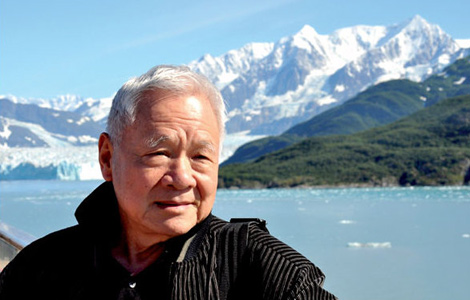
 Life in poetry
Life in poetry
 US first lady visits children in medical center
US first lady visits children in medical center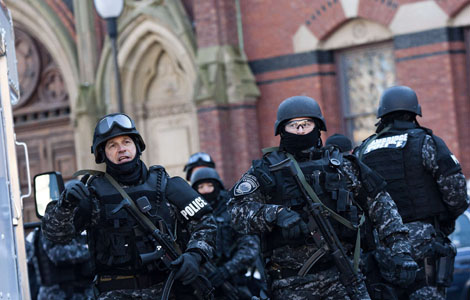
 Harvard reopens after bomb scare
Harvard reopens after bomb scare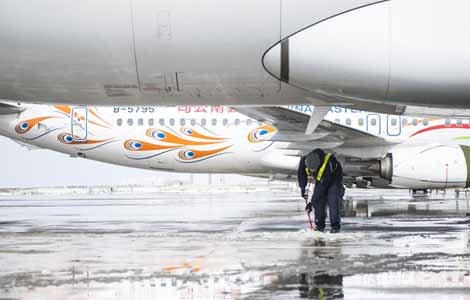
 Snowstorms cause chaos for travelers in Yunnan
Snowstorms cause chaos for travelers in Yunnan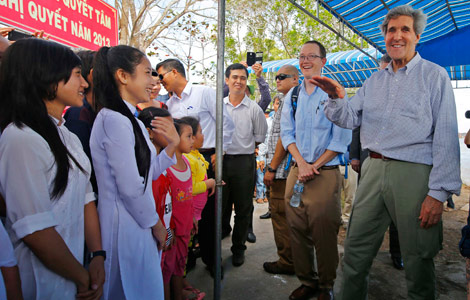
 Kerry offers Hanoi aid in maritime dispute
Kerry offers Hanoi aid in maritime dispute
Most Viewed
Editor's Picks

|

|

|

|

|

|
Today's Top News
Vast deposits of 'flammable ice' found
Russia to bail out Ukraine for $15 billion
System for organ donors test
Luxury market cooling down
Court to issue guide on private loan cases
US budget deal clears crucial vote in Senate
Japan seeks bigger role for military
Hukou reforms target 2020: official
US Weekly

|

|







